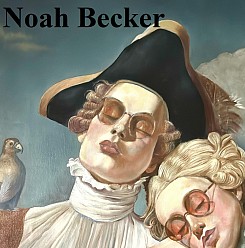Whitehot Magazine
January 2026
"The Best Art In The World"
"The Best Art In The World"
January 2026
October 2007, ARBITRARY CULTURE, THE FIAT CURRENCY AND ENGRISH.COM

Images from Ingrish.com
Considerations of a Post-millennial Economic Aesthetic
By Hans Michaud
In 1913, the United States began to remove its currency from the gold standard it had been on since 1834 de facto and 1900 de jure. The gold standard is, in fact, a system where the currency in circulation is equally represented by an internationally agreed upon amount in gold.
The aforementioned is instructive. 1913 is also the year that Igor Stravinsky's Rite of Spring was premiered. It is often commented that Rite of Spring is the official birth of modernism and the modern era (read: Official 20th Century).
In 1971 the U.S. removed the last of its gold-standard vestiges under President Richard Nixon. This is also instructive. That very same year the Arab-American Ihab Hassan was one of the first to coin the phrase postmodernism in his book The Dismemberment of Orpheus: Towards a Postmodern Literature.
In this view, since the U.S. dollar no longer had anything of substance backing it up, the value of the dollar was entirely arbitrary; an arbitrary fiat currency.
When considering the many functions of art in our post-industrial, post-modern economy and culture, there is one consideration that still captures my attention amidst the clatter of our currents: that of contemporary art acting as a mirror to the cultures at large.
When considering this, the question that keeps cropping up to me is the obvious one: what art in the world might function as a mirror to the culture of the U.S., the dominant economic culture of the postmodern/arbitrary fiat currency?
One answer came to me in the form of a fairly popular web page, a celebration of Japanese culture's re-commoditization of U.S. culture: Engrish.com.
Engrish.com , self-explanatory in its name, is a hodgepodge of samples of Japan's aping of popular U.S. commercial packaging, safety signs, instructional labels, t-shirts, etc. Everything is represented: fast food, underwear, you name it. This is the purpose of the entire website: to promote the arbitrariness of an understandably slapdash interpretation of both the English language and the culture(s) that utilize it.
For the purposes of this essay I'll ignore the humor quotient (the main thrust of the website) and focus on the "cultural mirror" aspect. But before I elaborate further on this matter, I'll state here my opinion on a certain issue: if we're to believe anything that Karl Marx wrote, we might as well go with his notion that culture is greatly informed by economics. The reason I'm bringing this up is only to illustrate that since the removal of the gold standard (the final domino was toppled by Richard Nixon) in 1971, "culture" as we know it has arguably become progressively more unhinged, that is, more and more bereft of standards of quality, "high" and "low" meaning less and less as the years passed. This subject has been hashed over and debated ad nauseum but suffice it to say that it is not merely a coincidence that the term postmodernism appeared approximately the same time that the standard currency began a free-float.
Fluctuations in the market (i.e. the recent subprime mortgage financial crisis) are answered, nay, assuaged by the Federal Reserve simply printing more currency and releasing it into the market. In the short-term this tends to "smooth out" the large wrinkles; however, in the long run this tends to severely over-inflate the currency, making it potentially more unstable in the eyes of the world and weakening its buying power overall. Hence, the dollar's arbitrary value. Any parallel in the art world is strictly coincidence.
Engrish.com takes as its point of departure the barest essence of the U.S. commodity: the package label. In this context, label may be a package design, a t-shirt, a logo. Whatever the case, Engrish.com is the purest mirror to our landscape of commodities and monied exchanges and the cultures that arise from this arena. Much more effectively than anything I've seen in the art world currently, Engrish.com is the purest spectacle-as-commentary out there. With labels such as "BARF Magic Brightness" (detergent), "BLACK BOSS" (espresso) and "HOTEL HAPPY KISS!" (hotel sign), nothing else comes close to this level of playing-field leveling, (save for WACKY PACKAGES in the 1970s). Japan's joyous and ecstatic jumble of the current English business and marketing languages perfectly and (I'm assuming) unwittingly plays off the sheer arbitrariness which is at the heart of it in the first place. There is no standard backing up the U.S. currency and therefore culture, and there is no standard backing up Japan's aping of our marketing techniques. The English language is a free-for-all, the the monied culture is in free-fall.

Hans Michaud
Hans Michaud is a freelance journalist in New York.
SEND THIS WRITER A MESSAGE:
| hansmichaud@gmail.com |













